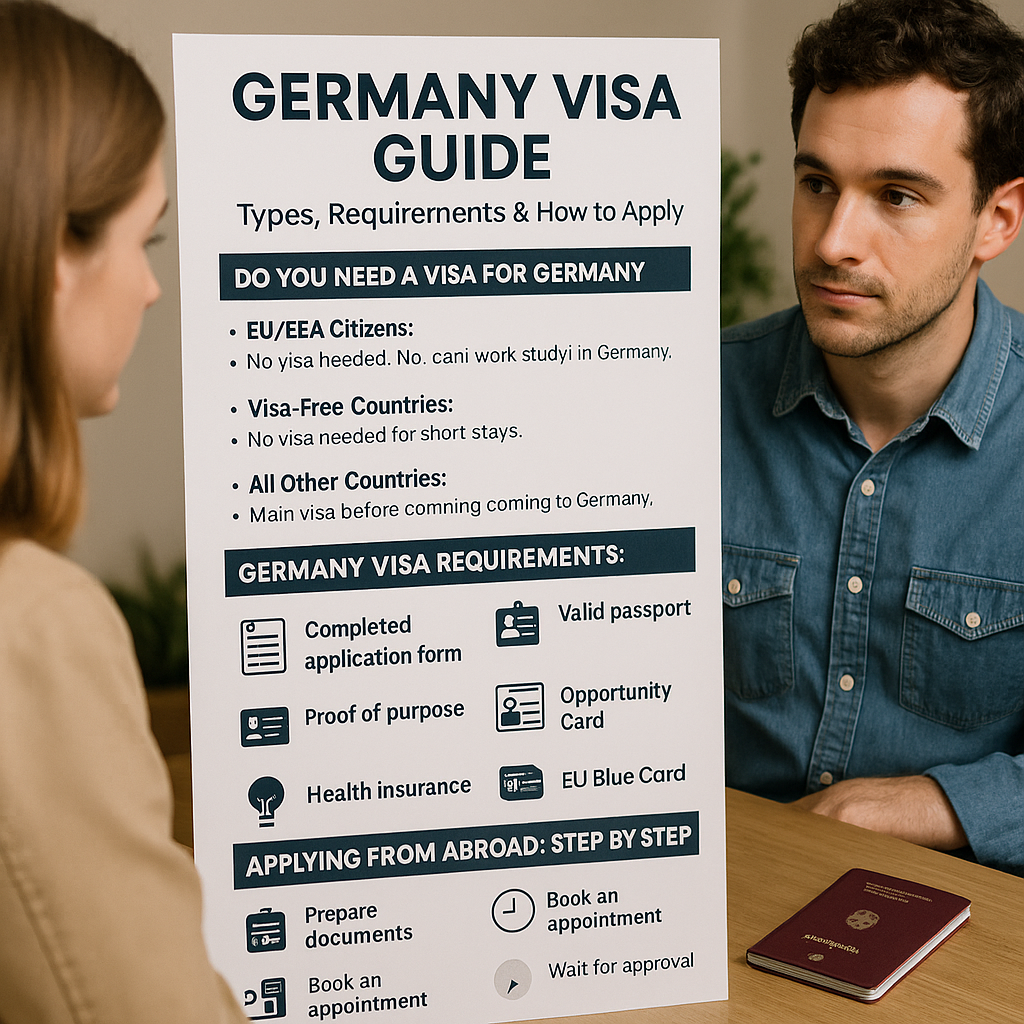Germany Visa Guide: Types, Requirements & How to Apply #
Welcome to your all-in-one introduction to getting a visa for Germany! Whether you’re coming for work, studies, freelancing, or simply exploring opportunities, this guide breaks down everything you need to know—from visa types to application steps and fees.
Do You Need a Visa for Germany? #
Let’s clarify who needs a visa—and who doesn’t.
EU/EEA Citizens: #
- No visa needed. You can live, work, and study in Germany freely.
Visa-Free Countries (62 countries including the USA, UK, Australia, Japan): #
- No visa needed for short stays. But for long-term stays, you must apply for a residence permit—often after arriving.
All Other Countries: #
- You need a visa before coming to Germany. This includes both short- and long-stay permits. You’ll need to apply from your home country.
Check your visa requirement status on the official German portal.
Germany Visa Requirements: What You’ll Need #
While every visa type has its own specifics, here are the core requirements shared across all long-stay German visas:
| Requirement | Details |
|---|---|
| Completed application form | Forms vary by visa type. Fill accurately & completely. |
| Valid passport | Must be valid for your stay + 3 extra months. |
| Proof of purpose | Job offer, university admission, or proof of freelance work. |
| Financial proof | Bank statements, blocked account, scholarship, or sponsor letter. |
| Health insurance | Travel health insurance initially, and local insurance for renewals. |

Main Visa Types for Germany #
Here’s a quick overview of the most common long-stay visa options—and what they’re for:
- Student & Language Course Visa
For those admitted to a university or attending a German language course. How to apply. - Work Visa
For applicants with a confirmed job offer in Germany. How to apply. - Job Seeker Visa
Gives qualified professionals 6 months in Germany to find a job. - Opportunity Card (Chancenkarte)
Germany’s newest points-based visa for skilled workers—no job offer required. How to apply. - Freelance Visa
For self-employed professionals or creatives with clients or income sources in Germany. How to apply. - EU Blue Card
Fast-track residence for high-skilled professionals with higher salary offers. How to apply. - Family Reunion Visa
For spouses, partners, or family members of German residents. How to apply. - Internship/Training Visa
For students or trainees who’ve secured practical training in Germany. - Business Visa
For those needing to stay longer than 90 days for business purposes.
Applying from Abroad: Step-by-Step #
- Prepare your documents
Complete the right visa form, gather passport, financial proof, health insurance, etc. - Book an appointment at your local German Embassy or Consulate
Walk-ins are not accepted. Wait times can vary. - Attend your appointment
Be on time with all originals + copies. You’ll pay the fee and submit biometric data. - Wait for approval
Processing times can range from weeks to a few months. Keep your confirmation safe!
Applying from Inside Germany (if visa-free) #
- Arrive and settle in
Find housing
Register your address (Anmeldung)
Get health insurance
Begin job/university/freelance setup - Book a residence permit appointment
This can take weeks—book early! Book in Berlin here - Gather documents
You’ll get a checklist via email after booking. - Attend your appointment
Bring all documents, be on time, and bring a German-speaking friend if possible.
Processing Times #
There’s no fixed timeframe, but processing depends on:
- Visa type
- Your profile & supporting documents
- Embassy/immigration office capacity
- Time of year
- Whether your employer supports fast-tracking (if applicable)
Pro Tip: Apply early and allow for delays. If you’re already in Germany, ask for a temporary extension while waiting for approval.
Leave your comment